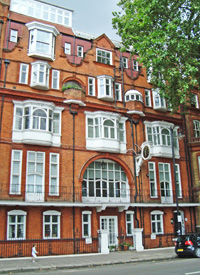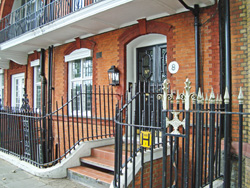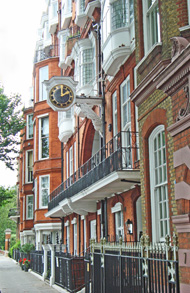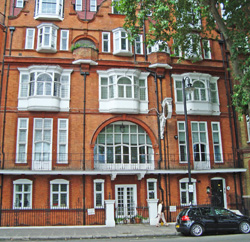Mrs Mitchison's
Hospital for Officers
Hospital for Officers
The Clock House, 8 Chelsea Embankment, SW3 4LE
Medical
dates:
Medical
character:
Convalescent (military)
In 1916 Mrs Mary E. Mitchison (1897-1999) opened an auxiliary military hospital in her home on the Chelsea Embankment.
Mrs Mitchison's Hospital for Officers had 30 beds and was affiliated to Queen Alexandra's Military Hospital at Millbank.
As the Hospital was very close to the Chelsea Physic Garden, Mrs Mitchison thought that some of the patients, especially those suffering from shell shock, might benefit from spending time in the quiet of the Garden. In May 1916 she wrote to the Secretary of the Garden, but was told that the Committee would most likely refuse permission when it met in June. Mrs Mitchison then wrote to the Editor of The Times, asking for public support for the patients to be allowed to use the Garden. The letter proved effective, with householders on the Chelsea Embankment joining in a petition to the Garden Committee to permit this. The Committee could hardly fail to agree and, for the duration of the war, up to 10 convalescent sailors and soldiers, together with their carers, were allowed to visit for a morning or an afternoon. Tickets were allotted to specific hospitals - and officers and men were allotted different times.
The Hospital closed in 1918. Between June 1916 and April 1918 some 366 patients had received treatment there.
Mrs Mitchison's Hospital for Officers had 30 beds and was affiliated to Queen Alexandra's Military Hospital at Millbank.
As the Hospital was very close to the Chelsea Physic Garden, Mrs Mitchison thought that some of the patients, especially those suffering from shell shock, might benefit from spending time in the quiet of the Garden. In May 1916 she wrote to the Secretary of the Garden, but was told that the Committee would most likely refuse permission when it met in June. Mrs Mitchison then wrote to the Editor of The Times, asking for public support for the patients to be allowed to use the Garden. The letter proved effective, with householders on the Chelsea Embankment joining in a petition to the Garden Committee to permit this. The Committee could hardly fail to agree and, for the duration of the war, up to 10 convalescent sailors and soldiers, together with their carers, were allowed to visit for a morning or an afternoon. Tickets were allotted to specific hospitals - and officers and men were allotted different times.
The Hospital closed in 1918. Between June 1916 and April 1918 some 366 patients had received treatment there.
Present status (July 2010)
The Clock House was converted into apartments in the 1920s. Today it is Grade II listed.

The Clock House is now an apartment block.

The current main entrance is to the right of the central windows.

The clock is at the first floor level, just to the right of the central windows (above and below).

(Author unstated) 1916 The Chelsea Physic Garden. The Times, 24th May, 11.
(Author unstated) 1917 List of the various hospitals treating military cases in the United Kingdom. London, H.M.S.O.
Marti S 2012 It's draining men: public opinion, military necessity and the British response to shell shock during the first world war. In: Proceedings of the 18th Annual History of Medicine Days Conference 2009. Newcastle upon Tyne, Cambridge Scholars Publishing. Pp. 75-86.
http://chelseaphysicgarden.co.uk
http://collage.cityoflondon.gov.uk
http://discovery.mationalarchives.gov.uk
www.britishlistedbuildings.co.uk
www.ipernity.com
www.victorianweb.org
Return to home page